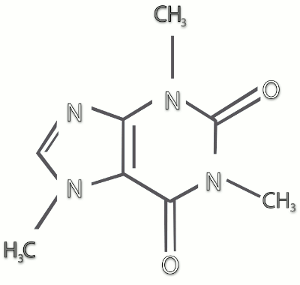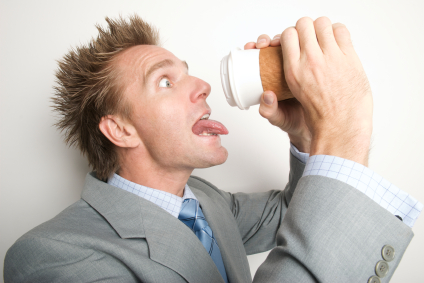To understand caffeine addiction, let’s first look at what caffeine is. Caffeine is an organic compound which, in its purest form, is white crystal-like powder. Primarily serving as a stimulant, caffeine can be found in varying amounts in approximately 60 different plants products including:
- Coffee shrubs
- Cocoa beans
- Tea leaves
Caffeine is odorless but registers a bitter taste when consumed. The chemical symbol for caffeine is C8H10N4O2 and its chemical structure appears below.

In plants caffeine serves as natural pest control protection, killing insects that ingest it. Regarding humans, more than 8 in 10 Americans consume caffeine every day in one form or another according to the majority of polling data available. It is estimated that more than half of all American adults consume an amount greater than 300 milligrams in any given day. In the United States, caffeine is easily considered one of the most socially accepted and recreationally abused psychoactive drugs.
Caffeine, also called mateine, theine or guaranine relative to its plant origin, functions as a stimulant in our brains in two ways:
- It has a chemical structure similar to that of the neurochemical adenosine and when we digest caffeine it affixes itself to our brain’s adenosine receptors. These receptors normally slow down the brain’s alertness level which, in most cases, causes drowsiness getting us ready for sleep.
- When we ingest caffeine we not only suspend drowsiness through a reduction in adenosine activity, this reduction, in turn, leads to increased activity of the neurotransmitters dopamine and glutamate. When we boost dopamine levels we often get a temporary euphoric feeling and find ourselves in good spirits (such is the case with other stimulants). It is also this second stimulating factor that causes addiction to caffeine.
We take in caffeine for various reasons. We consume chocolate, coffee, tea, and soda to be able to keep our alertness up and in some cases, keep ourselves awake. Consuming caffeine in moderation gives us the sensation of having rejuvenated energy. It gives our mind a boost and can have the ability to help us focus on the tasks we’re about to do.
Some of the resulting physiological characteristics of digesting caffeine are:
- Increasing heart rate
- Relaxing of air passageways
- Improving muscle blood flow
- Discharging of stored energy from the liver to supply
In addition to the above, caffeine is a diuretic and stimulates diuresis (in short, it makes us urinate). Since caffeine is a stimulant and a diuretic some also use the drug as a short-term way to lose weight.
Although moderate caffeine use is considered fairly safe if we take in large quantities of caffeine over a long period of time (also known as “caffeinism”) the drug is not without potential consequences such as restlessness, nervousness, irritability, anxiety, insomnia, heart problems, and in a few rare cases even death.
Although caution should be asserted when taking any chemical compound, caffeine remains one of the most globally accepted drugs. The various uses for caffeine continue to grow and it is showing up in more consumer goods every month (ex. hair shampoo, soap, eye creams, etc.) and there is no shortage of performance-enhancing nutraceuticals being created that include caffeine as an ingredient. Caffeine is safe for most of us when used modestly and has secured its place for now as the world’s favorite stimulant and the most common ergogenic aid used by today’s aspiring athletes.
Caffeine addiction is an addiction to the ingredient in coffee, tea, soda, and other consumables that energizes us. Caffeine is a legal drug that is great for giving us a needed pick-me-up but is also something we get addicted to. These products give us energy because caffeine is a stimulant. In some cases, caffeine also helps us concentrate. It gives us a boost of energy, but this boost doesn’t always translate into better productivity. For instance, we are better off sleeping than staying up on caffeine to cram for an exam because most of the stuff we attempt to learn during an all-night study session will not get stored in our long-term memory without some REM sleep.

Caffeine it not without its benefits when ingested in moderation. Coffee and tea both have antioxidant effects. They both stimulate the mind and improve performance to some degree in low concentrations. What dosage is the right amount for any given individual is something being debated.
According to the Food and Drug Administration, a 12 ounce can of soda should not contain more than 71 mg of caffeine, but energy drinks like Red Bull, Monster, and Rockstar have a much higher concentration of this compound. These drinks fall beyond the purview of the FDA because of their classification as nutritional supplements. Regular brewed coffee has about 85 mg of caffeine per 8 ounce serving. The same quantity of instant coffee has about 60 mg of caffeine. Tea’s caffeine content (when brewed) is about 47 mg for an 8 ounce serving.
These days, people ingest much more caffeine than ever before without giving it much thought. Each time we consume a can of Coke or Pepsi, about 30 mg of it is getting into our circulation. When we are at Starbucks enjoying our daily brew, we are ingesting even more caffeine. If the same day we have a can of Red Bull as well, our caffeine intake becomes quite high for the given day. This kind of routine is not uncommon any more. Most health experts concur that more than 600 mg of caffeine each day is unhealthy (this is according to the Food and Drug Administration’s Caffeine and Your Body white paper).
The issue with heavy caffeine use is there is a psychological and physical dependency that develops with use over time. We build a tolerance to this stimulant if used in excess, meaning we want to ingest more and more of the stuff to get the same energy boost.
If we stop taking caffeine, we are likely to get withdrawal symptoms like with most stimulant drugs. Common withdrawal symptoms from caffeine are headache, lethargy, irritability, anxiety, insomnia, and sleepiness.
We can also overdose on caffeine which leaves us excitable, anxious, nervous, and tense. There are documented cases of people even dieing from too much caffeine. In very general terms, anything more than 300 mg of caffeine a day is considered unhealthy. Caffeine has cardiovascular effects that include an increase in heart rate, constriction of blood vessels, and an increase in blood pressure. These are effects that can precipitate a heart attack in susceptible people. The constrictive effect on blood vessels can also lead to temporary impotence. Caffeine is also a diuretic which can lead to dehydration and an overactive bladder.
Do you need caffeine to get going in the morning? You may have a mild caffeine addiction already. The way to break out of this is by slowly reducing your caffeine intake each day by satiating the need for caffeine with drinks containing less caffeine (like tea) and then slowly trying to eliminate the stimulant completely. Be fair to yourself and don’t try to quit cold turkey. If you aren’t prudent the withdrawal symptoms might compel you to go back to your normal routine. You will have to exercise your mental strength along with a slow reduction in caffeine intake to achieve your goal of kicking the habit! If you have any questions about caffeine of caffeine addiction, please provide them in the comment box below.

[…] When we ingest caffeine we not only suspend drowsiness through a reduction in adenosine activity, this reduction in turn leads to an increased activity of the neurotransmitters dopamine and glutamate. When we boost dopamine levels we often get a temporary euphoric feeling and find ourselves in good spirits (such is the case with other stimulants). It is also this second stimulating factor which causes addiction to caffeine. […]